- Home
- Parents & Students
- Pre-Public Examinations
- Year 11
Year 11
“I never dreamed about success. I worked for it.”
—Estée Lauder
Year-11-Revision-Strategies PowerPoint
In this section you will find a summary of every GCSE option offered at the Academy. This should be the starting point for all students to guide their personal revision at home.
Students should use the strategies outlined in their revision assemblies and as guided by their teachers. The November exams should be considered as a key steppingstone on their journey to success in the summer. These exams will also be a powerful tool for students and teacher to understand key areas of focus moving forward.
In addition to the support and intervention offered by the different departments, students can also access the library from 2:40pm-3:40pm to use the ICT facilities or have a quiet place to work. Students should have their login details for our online platforms; Educake, Sparx Maths, LanguageNut, Seneca and GCSEPod. The platform each subject use is detailed on the following subject pages. If there are any issues, please contact your child's teacher.
Thank you for taking the time to read and engage with this information and for your ongoing support of your child in the final stages of their time at Oulton Academy. Where ‘NEA’ is referenced, this means Non-Exam Assessment.
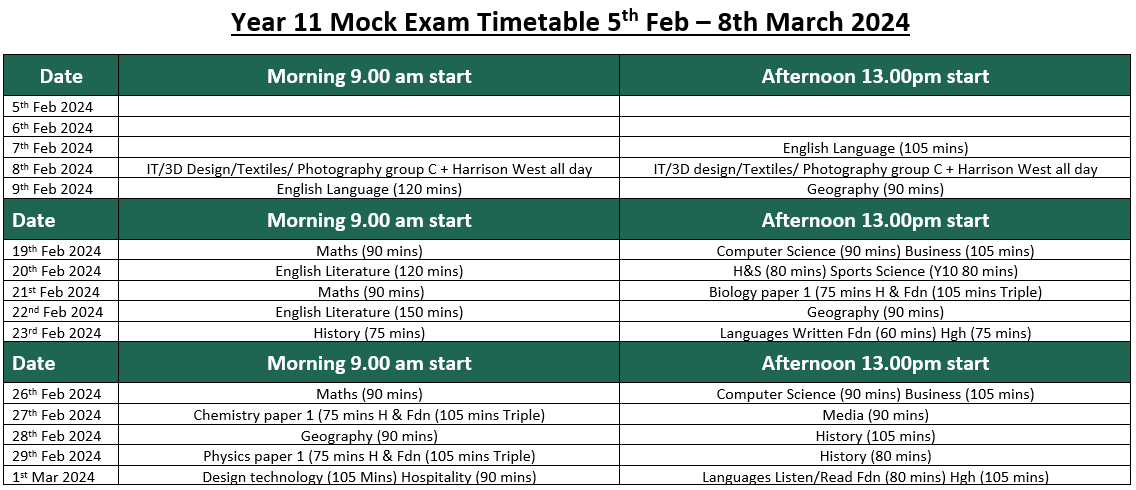
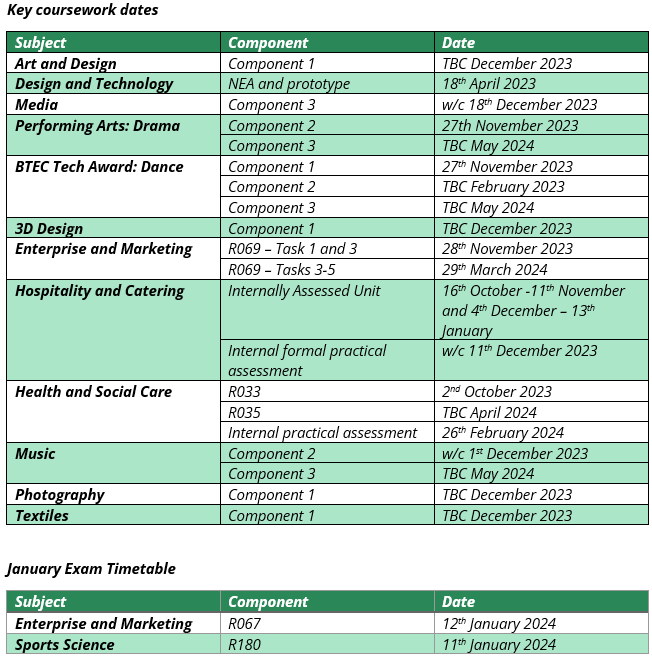
English Language -Eduqas GCSE
The November PPEs will feature both papers (component 1 and component 2). Students have sat multiple versions of each paper in class. They have also prepared a creative writing prose piece they must adapt to fit the stimulus of the tasks. If they were absent during the creation of the piece (end of Year 10), they MUST see Mrs Bletsoe to book in for one-to-one tutoring after-school to prepare a piece.
The day before each exam, students will complete a Walking-Talking Mock in the exam venues with members of the English Department.
Students sit two GCSE English Language papers:
Component 1:
20th Century Fiction and Creative Prose Writing (1 hour 45 minutes)
Section A) Reading (40 marks) – students will be given an unseen extract from one 20th century literary prose text; they will then answer questions on the text.
Section B) Prose Writing (40 marks) – students will be offered a choice of four titles and will be given the opportunity to create a creative and imaginative piece of writing.
Revision Tips! Practise re-writing your narrative stories which you will have created and developed in your English lessons. Set yourself a 45-minute timer and see how much you can write in that time (4 sides of A4 is the desired amount). Always check through your stories carefully for punctuation, spelling errors and use of capital letters.
Component 2:
19th and 21st Century Non-Fiction and Transactional/Persuasive Writing (2 hours)
Section A) Reading (40 marks) - students will be given two unseen non-fiction texts to read. These may include autobiographies, biographies, diaries, reports and articles. Students will answer questions on each text as well as comparing the two texts.
Section B) Transactional Writing (40 marks) – students will complete two writing tasks, equally weighted (20 marks each). Across both tasks, students will be given the opportunity to write for a range of audiences and purposes.
Revision Tips! Read through as many formal letters, articles, reviews, reports, guides, and speeches as possible looking for IAMDAFORESTER techniques. Practise writing these forms of writing. Set yourself a 30-minute timer and see how you get on. Remember, create a four-point plan before writing!
Useful Websites:
https://www.bbc.co.uk/bitesize/examspecs/zpxh82p?scrlybrkr=6afcd73d
www.educake.co.uk
English Literature - Eduqas GCSE
The November PPEs will both papers (component 1 and component 2). Students have covered all of the set texts and the poems in Year 10. After-school English and Educake homework have focused on English Literature revision, and all students have been given a pack of seven revision guides and workbooks to aid them further.
Students sit two GCSE English Literature papers:
Component 1:
Shakespeare and Poetry Anthology (2 hours)
Section A) Shakespeare: Macbeth (40 marks) – students will be given one extract-based question and one essay question on the text as a whole. Students will be expected to show their knowledge of dramatic techniques, and demonstrate their understanding of plot, characterisation, events and key themes. This section will also test spelling, punctuation and grammar.
Revision Tips!Use your Macbeth Revision Guides to help consolidate your learning of the play (please see the revision calendars for each literature text); make notes from your exercise book; read through and make notes from your annotated script and your annotated script extracts in your exercise books from Year 10.
Useful websites:
BBC Bitesize: https://www.bbc.co.uk/bitesize/topics/zp32frd
YouTube Macbeth Eduqas: https://www.youtube.com/watch?v=-L6J0-G8CDk
Schmoop: https://www.shmoop.com/study-guides/literature/macbeth/summary
SparkNotes: https://www.sparknotes.com/shakespeare/macbeth/
Section B) Poetry Anthology (40 marks) - students will explore two poems from the poetry anthology across two questions. The first question requires them to re-read one of the poems from the anthology (printed in the exam paper) and discuss it in relation to a theme-based question. The second question requires them to, from memory, compare the first poem to one of their choice from the anthology. They will be expected to consider the content and key ideas of each poem and the poets’ use of language, structure and form.
Revision Tips! Use your exercise book from last year, along with the revision guide for poetry, to help consolidate your knowledge.
Useful Websites:
Educake: www.educake.com
Mr Bruff’s Eduqas Poetry Playlist: https://www.youtube.com/playlist?list=PLGjazfmiZg9xvH88lXaxsNlFDdy23Fx4S
Component 2:
An Inspector Calls, 19th C text (A Christmas Carol or Dr Jekyll and Mr Hyde), and Unseen Poetry (2 hours 30mins) Section A) 19th C text: A Christmas Carol / Dr Jekyll & Mr Hyde (40marks) – students will be expected to comment upon the context of the text, the language, structure and form and be able to write about key themes, characters, plot and ideas within the text.
Revision Tips! Use your revision guide and workbook to help consolidate your learning of the novella (please see the revision calendars for each literature text); make notes from your exercise book; read through and make notes from your annotated text.
Useful websites:
BBC Bitesize: https://www.bbc.co.uk/bitesize/topics/zsbmycw
Mr Bruff’s Guide to Jekyll & Hyde: https://www.youtube.com/watch?v=mpMdy9YGdZc
SparkNotes: https://www.sparknotes.com/lit/jekyll/
Section B) Post-1914 Prose Drama: An Inspector Calls (40 marks) – students will be presented with an extract from the play as well as writing about the play as a whole. Students will need to comment on the writer’s use of language, structure and form and will need to show an understanding of key themes, characters and ideas within the extract and the whole play. The assessment will also test spelling, punctuation and grammar.
Revision Tips! Use your An Inspector Calls revision guide and workbook to help consolidate learning (please see the revision calendars for each literature text); make notes from your exercise book; read through and make notes from your annotated script.
Useful websites:
BBC Bitesize: https://www.bbc.co.uk/bitesize/topics/zqt9mnb
SparkNotes: https://www.sparknotes.com/drama/an-inspector-calls/
Section C) Unseen Poetry (40 marks) – students will explore two unseen poems from the 20th and or 21st centuries. In the first question, students will be asked to write about a previously unseen poem. In the second question, students will be asked to write about a second unseen poem and compare it to the first. They will be expected to consider the content and key ideas of each poem and the poets’ use of language, structure and form.
Revision Tips! Read a wide range of short poems. Explore the language and structural devices the poet is using and make notes on these. Consider the tone and overall message of the poem and its themes.
Useful websites:
BBC Bitesize: https://www.bbc.co.uk/bitesize/guides/zxvfsg8/revision/1
Eduqas: https://resources.eduqas.co.uk/Pages/ResourceSingle.aspx?rIid=967
Intervention:
English Intervention takes place every Wednesday 2:40pm - 3:40pm (please see the calendar below for specific details)
All students have been given seven revision guides and workbooks, alongside a calendar indicating specific pages to complete (the calendar is available to parents on the academy website: https://www.oultonacademy.org.uk/48/news/post/210/english-department-provides-free-resources-for-all-year-11s
Weekly homework / revision is set on Educake: https://www.educake.co.uk/my-educake Students can access GCSE Pod to help with revision: https://www.gcsepod.com/
Revision Guides
The English Department has provided every Year 11 student with a pack of seven English Literature revision guides, that cover the students' set texts - for free! To support students with staggering their revision across the academic year, in time for the GCSE exam window, we have provided every student with a bespoke calendar, that recommends which pages they should read, and which quizzes they should complete each week. Parents/carers will also find this calendar extremely useful in encouraging and monitoring the revision their child completes at home. If you have any questions about the revision guides, please contact:
j.bletsoe@oultonacademy.org.uk
Useful websites:
BBC Bitesize: https://www.bbc.co.uk/bitesize/guides/zxvfsg8/revision/1
Eduqas: https://resources.eduqas.co.uk/Pages/ResourceSingle.aspx?rIid=967
Intervention: ·
- English Intervention takes place every Wednesday 2:40pm - 3:40pm (please see the calendar below for specific details)
- Students may be selected for one-to-one tutorials after-school on areas of specific need (please note, this service is provided at an additional cost to the academy which is why if students are selected, they must attend).
- Weekly homework / revision is set on Educake: https://www.educake.co.uk/my-educake
- Students can access GCSE Pod to help with revision: https://www.gcsepod.com/
Click here to see the after school calendar
Revision-Calendars-ACC-Version.pdfRevision-Calendars-JH-Version.pdf
Maths - Edexcel GCSE
The Maths GCSE comprises three 90-minute exams and is split between Higher and Foundation tier.
To help students prepare for the November PPE, a revision list has been provided. The information is in approximate specification order and not the order of the questions. The areas of content listed are suggested areas of revision focus – students may need additional topics or prior learning to answer all questions. Students will still be expected to apply their knowledge to unfamiliar contexts. A paper-by-paper revision list will not be available for the final exam in June; however, we are providing students with a breakdown for the November PPE to help them build confidence in their revision.
Please see the next two pages for the revision lists for each paper. Students have been given a copy with the Sparx Codes for each topic included – please encourage your child to work through these. Students have also been given revision guides to support their studies.
Tiers are decided on a student-by-student basis. If a student is confident and being successful with the Foundation paper, we can explore the student moving to Higher. This is a decision we can make in the run up to the exam and even on the day. Students will sit the tier where they will be the most successful.
Useful websites:
Intervention:
- Maths intervention takes place in the maths department every Thursday at 2:40pm – 3:40pm
- Sparx Club runs on a Tuesday in N1 for Year 11 students to access support with Sparx Maths
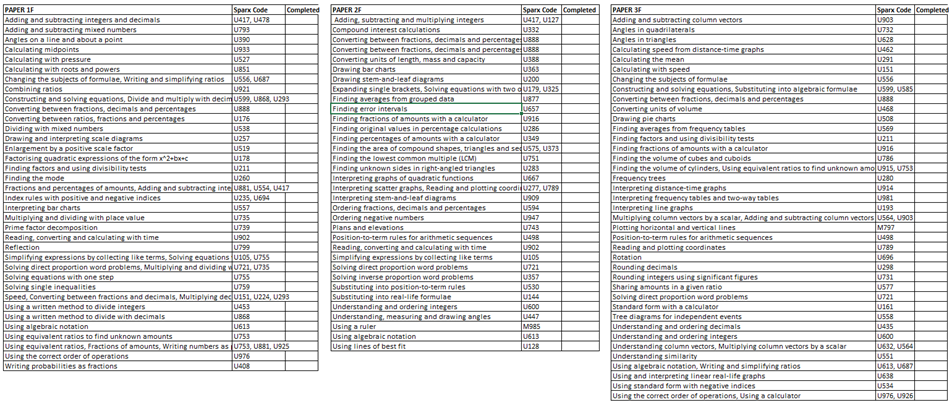
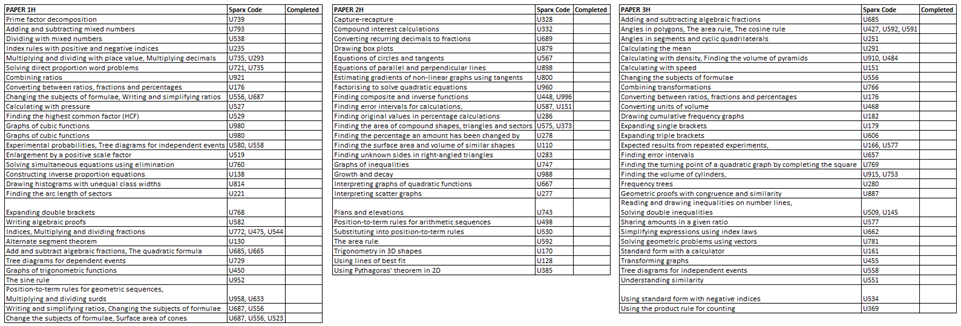
Science Trilogy - AQA GCSE
This year learners will not be receiving advanced information, therefore, to make the PPEs as realistic as possible, we will not be providing the learners with a detailed list of topics to revise. Below is a list of topics that can be assessed on each of the paper 1s. Learners should expect questions they have not seen before. Topics listed in the table cover all content that could be assessed on paper 1, however, a listed topic may not appear in the November mock exam.
Pupils will sit Biology Paper 1, Chemistry Paper 1 and Physics Paper 1 in November, each exam is 1 hr 15 min and 70 marks.
Learners have been provided with a free revision guide in Year 10, the table of contents indicates whether the content appears on paper 1 or paper 2. For November PPEs the learners only need to revise paper 1 content.
PPE Papers (Higher and Foundation)
Biology Paper 1
4.1 Cell biology
4.2 Organisation
4.3 Infection and response Bioenergetics
4.4 Bioenergetics
Chemistry Paper 1
5.1 Atomic structure and the periodic table
5.2 Bonding, structure, and the properties of matter
5.3 Quantitative chemistry
5.4 Chemical changes
5.5 Energy changes
Physics Paper 1
6.1 Energy
6.2 Electricity
6.3 Particle model of matter Atomic structure
6.4 Atomic structure
Other useful websites for revision include:
Click here for the specification.
Save my exams – free revision notes, practice questions and past papers specific to the specification (you will need to scroll down once you have clicked on the link):
Biology Combined
https://www.savemyexams.co.uk/gcse/biology_combined- science/aqa/18/
Chemistry Combined
https://www.savemyexams.co.uk/gcse/chemistry_combined- science/aqa/18/
Physics Combined
https://www.savemyexams.co.uk/gcse/physics_combined- science/aqa/18/
Combined Science
https://www.bbc.co.uk/bitesize/examspecs/z8r997h?scrlybrkr=1bed25d7
All content broken down into 5-minute chunks
https://www.youtube.com/c/Cognitoedu/playlists
Primrose Kitten – revision playlist for all paper 1s
https://www.youtube.com/c/PrimroseKittenScience/playlists?vi ew=50&sort=dd&shelf_id=2
Intervention:
Weekly homework / revision is set on Educake: https://www.educake.co.uk/my-educake
Intervention runs after school on a Monday in the Science Department 2:40pm-3:40pm
Science Triple - AQA GCSE
This year learners will not be receiving advanced information, therefore, to make the PPEs as realistic as possible, we will not be providing the learners with a detailed list of topics to revise. Below is a list of topics that can be assessed on each of the paper 1s. Learners should expect questions they have not seen before. Topics listed in the table cover all content that could be assessed on paper 1, however, a listed topic may not appear in the November mock exam.
Pupils will sit Biology Paper 1, Chemistry Paper 1 and Physics Paper 1 in November, each exam is 1 hr 45 min and 100 marks.
Learners have been provided with free revision guides in Year 10, the table of contents indicates where content is paper 1 and paper 2. For November PPEs the learners only need to revise paper 1 content.
PPE Papers (all learners will sit Higher)
Biology Paper 1
4.1 Cell biology
4.2 Organisation
4.3 Infection and response
4.4 Bioenergetics
Chemistry Paper 1
4.1 Atomic structure and the periodic table
4.2 Bonding, structure and the properties of matter
4.3 Quantitative chemistry
4.4 Chemical changes
4.5 Energy changes
Physics Paper 1
4.1 Energy
4.2 Electricity
4.3 Particle model of matter
4.4 Atomic structure
Other useful websites for revision include:
Specifications: Biology Chemistry Physics
BBC Bitesize
Biology: https://www.bbc.co.uk/bitesize/examspecs/zpgcbk7?scrlybrkr=1bed25d7
Chemistry: https://www.bbc.co.uk/bitesize/examspecs/z8xtmnb
Physics: https://www.bbc.co.uk/bitesize/examspecs/zsc9rdm
All content broken down into 5-minute chunks
https://www.youtube.com/c/Cognitoedu/playlists
Primrose Kitten – revision playlist for all paper 1s
https://www.youtube.com/c/PrimroseKittenScience/playlists?vi ew=50&sort=dd&shelf_id=2
Intervention:
-
Weekly homework / revision is set on Educake: https://www.educake.co.uk/my-educake
-
Intervention runs after school on a Monday in the Science Department 2:40pm-3:40pm
Geography - AQA GCSE
The upcoming November PPEs will align with the full specification. Additionally, we have extended the duration of Paper 3 by 15 minutes, aligning with the recent changes announced by AQA.
To prepare students effectively, an advanced pre-release booklet has been provided alongside Paper 3. This booklet will be covered in lessons to ready students for the upcoming PPEs. Subsequently, students will sit the examination based on the content covered in the booklet, including fieldwork. This process closely mimics the actual examination scenario where the pre-release material is given to students 12 weeks before the June exam.
Students will complete:
- Paper 1- Living with the physical environment- 1 hour 30 minutes, 88 marks, worth 35%.
- Section A: Natural Hazards (33 marks),
- Section B: Living World (25 marks),
- Section C: Coasts (15 marks)
Section C: Rivers (15 marks)
- Paper 2- Challenges in the human environment- 1 hour, 58 marks, worth 35%.
- Section A: Urban issues (33 marks),
- Section B: The Changing Economic World has been removed from this paper as we will complete it in January through February
- Section C: The Challenge of Resource Management (25 marks). Questions 3 and 4 (Food). Questions 5 (Water) and 6 (Energy) are left blank as we have chosen Food as our optional topic. This reflects the same process students will follow in the real thing.
- Paper 3- Geographical Applications – 1 hour 30 minutes, 76 marks, worth 30%.
- Section A: Issue Evaluation (37 marks)
- Section B: Unseen Fieldwork (16 marks) and our Hornsea Fieldwork (23 marks)
A more detailed revision checklist has already been given to students in geography lessons via The Geography Survival Kit booklet, comprehensive AQA GCSE revision guide, Case Study knowledge organisers and a day-by-day revision timetable (all in a handy orange revision folder).
Useful websites:
- In geography we are running a Seneca competition https://app.senecalearning.com/
Students should have already joined the class so can log on and complete revision questions. There will be prizes for students that complete their assignments
- Students can access GCSE Pod to help with revision. They have been emailed bespoke revision playlists from Mr Thornton: https://www.gcsepod.com/
Intervention:
- Geography Intervention takes place every Tuesday in S7 at 2:40pm - 3:40pm
History - Edexcel GCSE
For 2024, history will have four topics assessed over three papers. For the November PPE, students will be assessed on content they have been taught so far on the course. The November exam will include all three papers with every topic examined.
The details for each paper can be found below:
- Paper 1: Thematic study and historic environment 1 hour and 15 minutes, 52 marks, worth 30%.
- Section A: The British sector of the Western Front, 1914-18: injuries, treatment and the trenches.
- Section B: Medicine in Britain, c1250-present.
- Paper 2: British depth study 1hr 45minutes, 64 marks, worth 40%.
- British depth study: Anglo-Saxon and Norman England, c1060-88
- Period Study: Superpower relations and the Cold War 1941-91
- Paper 3: Modern depth study 1 hour and 20 minutes, 52 marks, worth 30%.
- Weimar and Nazi Germany, 1918-39.
Each student has been given four revision guides free of charge which can be used to support their revision. These are suitable for all students in achieving the top grades. Exam questions for practice are available from their class teacher. Revision resources such as blank flash cards are available from their class teacher.
Useful websites:
- In history we are running a Seneca competition https://app.senecalearning.com/
- Students should have already joined the Year 11 class for homework. They have access to the entire GCSE exam content so they can log on and complete revision questions. There will be prizes for students that complete all their homework.
- Students can also use the resources found on the following pages:
Intervention:
- History Intervention takes place every Tuesday at 2:40pm - 3:40pm.
- Intervention timetables have been given to all students so they can see what topic is covered each week.
Spanish - AQA GCSE
Students will sit 4 papers, each of which will comprise 25% of the grade awarded. The timings differ slightly. depending on whether students are entered for Foundation or Higher papers.
-
Paper 1 (Listening) F: 35 mins; H: 45 mins.
-
Paper 2 (Speaking) F: 7–9 minutes; H: 10–12 minutes H (F/H: +12 minutes preparation time).
-
Paper 3 (Reading) F: 45 mins F; H: 1 hour.
-
Paper 4 (Writing) F: 1 hour F; H: 1 hour 15 mins
For the November PPE examinations, questions will be drawn from the following topics, which are the topics that have been covered in teaching to date:
Theme 1 – Identity and culture
Topic 1: Relationships with family & friends.
Topic 2: Free-time activities (including technology).
Theme 2 – Local, national, international and global areas of interest
Topic 1: Home, town & region.
Topic 2: Travel & tourism.
Theme 3 – Current and future study and employment
Topic 1: Life at school.
Revision Tips
- Speaking exam: Conversation booklets; photo card key phrases; role play key phrases.
- Writing exam: Conversation booklets; practise 40/90/150-word tasks in exercise books; grammar notes in exercise books; ’50 key Spanish verbs’ sheets; ‘key structures’ sheets.
- Listening & Reading exams: See full list of AQA exam vocabulary in back of AQA GCSE Revision Guide.
Useful Websites
- Past papers are available at www.revisionworld.com. It is important to practise past papers and become familiar with question formats.
- www.languagenut.com All students have personal logins and should be using Languagenut as a study and revision aid on a weekly basis throughout the academic year.
- www.gcsepod.com contains a series of videos which are extremely useful for revising grammar in particular. All students have personal logins.
- www.bbc.co.uk/bitesize contains a good, clear section on GCSE Spanish, including a series of listening tasks (some with video) and self-marking mini-tests.
- All students have been given, free of charge, AQA GCSE Spanish Revision Guides & Workbooks.
Intervention
- Spanish Intervention takes place on Tuesdays in C11 (Higher) / C9 (Foundation) at 2:40pm - 3:40pm. Higher and Foundation alternate each week.
- Please see Miss Gelley or Miss Land for further support required on an individual basis.
Art & Design - AQA GCSE
Art and Design students must complete component 1 (coursework portfolio worth 60% of the overall GCSE grade) and component 2 (externally set exam worth 40% of the overall GCSE grade).
There are four Assessment Objectives which are each marked out of 24, the total maximum marks available is 96. The coursework and externally set unit are marked separately.
- AO1 Develop ideas and respond to the work of others
- AO2 Refine ideas and experiment with different media
- AO3 Record ideas – observations, drawings, photographs and written notes
- AO4 Create a personal response.
For the November PPE there will be a 5-hour session for students to work on an outcome for their current coursework project.
The coursework portfolio must include both:
- A sustained project developed in response to a theme, evidencing the journey from initial engagement with an idea to the realisation of intentions.
- A selection of further work resulting from projects undertaken in Year 10.
The work submitted for this component will be marked as a whole.
Component 1 Coursework deadline – December 2023
The externally set exam (component 2) must include: a sustained project developed in response to a theme, evidencing the journey from initial engagement with an idea to the realisation of intentions.
The Controlled Test paper will be given out the first week in January. It consists of seven themed starting points; students will choose ONE starting point.
Students will work their way through the project, developing ideas, looking at the work of other artists, creating work in the style of the artist and refining ideas using a wide range of media, techniques, and styles.
The controlled test culminates in a 10-hour timed session, usually run over two school days. At this point sketchbooks must remain in school and are not allowed to be added to. The timed sessions will run in March 2024.
Intervention:
- Friday evenings 2:40pm - 3:40pm in the Art Department
- Attendance at Intervention and any drop-down days is a must. Mrs McIntosh will provide further details on an individual basis.
Business - Edexcel GCSE
The Business GCSE consists of two exams covering two themes; investigating small business and building a business. The November PPE will also have two exam papers:
- Paper 1 – Based on Theme 1 topics – 1 hour 45 mins
- Paper 2 – Based on Theme 2 topics – 1 hour 45 mins
To support students with their revision, please see the revision list on the next page.
Useful Websites
- Seneca https://app.senecalearning.com/
- BBC Bitesize https://www.bbc.co.uk/bitesize/examspecs/z98snbk
- GCSE Business Specification https://qualifications.pearson.com/content/dam/pdf/GCSE/Business/2017/specification-and-sample-assessments/gcse-business-spec-2017.pdf
- GCSE Revision Guide and Workbook – Students already have a copy of these. Relevant page numbers are after the revision topics.
Intervention
- GCSE Business Intervention takes place every Wednesday in E11 at 2:40pm - 3:40pm.
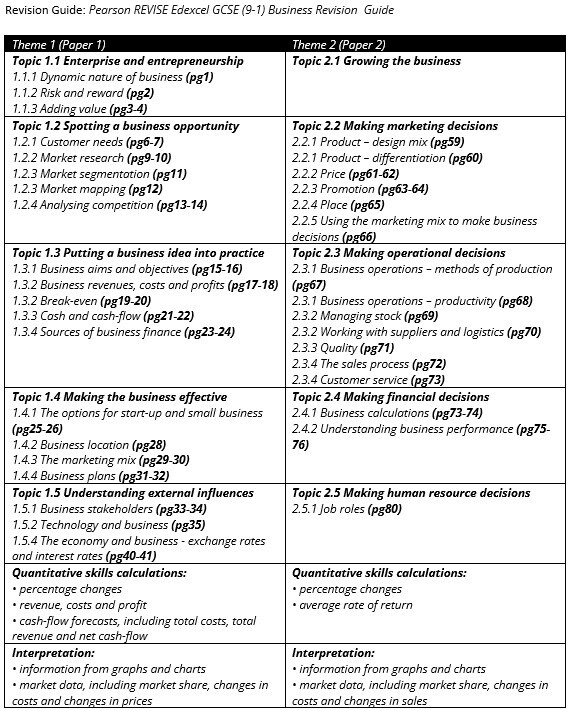
Computer Science - GCSE
The computer science assessment consists of two equally weighted papers. Each exam is normally 90 minutes but in the November examinations this will be extended to 105 minutes to allow a greater variety of content to be assessed.
Paper 1: Computer systems
The CPU – purpose, components and registers
CPU performance - how common characteristics of CPUs affect their performance
Embedded systems
Primary and secondary storage – Types and characteristics
Binary storage and data storage units (bits up to petabyte)
Converting between binary, hexadecimal and decimal
Binary shift and adding binary numbers
How a computer stores text, sound and images
Network structures and key hardware
Computer system security – forms of attack and methods of defence
The ethical, legal, cultural and environmental impact
Paper 2: Computational thinking, algorithms and programming
Principles of computational thinking (abstraction, decomposition)
Designing an algorithm in pseudocode and flow charts
Identifying errors in an algorithm (syntax and logic errors)
Completing trace tables
Application of searching algorithms (linear and binary) including pre-processing
Application of sorting algorithms (bubble, merge, insertion)
Programming constructs: sequence, selection and iteration
Meaning of Boolean operators (AND, OR, NOT)
Data types and their differences (integer, real, Boolean, character, string)
Completing and creating a SQL query
Logic gates – drawing a system based on a simple equation
Logic gates – Completing a truth table
Useful websites
· The Youtube channel Craig ‘n’ Dave have a series of excellent videos to provide an additional source of revision: https://student.craigndave.org/J277
· BBC bitesize (https://www.bbc.co.uk/bitesize/examspecs/zmtchbk) has a number of self-marking questions that can also aid revision
· Students have access to the Quizlet app to help them revise key terms and concepts
Intervention
· Intervention takes place every Friday in C14 2:40pm-3:40pm
· Homework is set weekly using a variety of exam style questions. If the homework sheet is lost then replacements can be found on Microsoft Teams.
Design & Technology - Edexcel GCSE
The Design and Technology course consists of two components, a written examination (1hr 45 minutes) and non-exam assessment (NEA). Both components are worth 50% of the GCSE and are 100 marks each.
Students will sit the exam component in November. Please see the revision list below for the content that will be assessed.
Paper 1DT0/1F – Timbers
1.2 How the critical evaluation of new and emerging technologies informs design decisions; considering contemporary and potential future scenarios from different perspectives, such as ethics and the environment
1.4 Developments in modern and smart materials, composite materials and technical textiles
1.12 The categorisation of the types, properties and structure of natural and manufactured timbers
7.2.3 The sources, origins, physical and working properties of each natural and manufactured timber and their social and ecological footprint - Manufactured timber
7.2.6 The sources, origins, physical and working properties of each natural and manufactured timber and their social and ecological footprint - Working properties – the way in which each material behaves or responds to external sources
7.3 The way in which the selection of each natural and manufactured timber is influenced
7.7 Specialist techniques, tools, equipment and processes that can be used on each natural and manufactured timber to shape, fabricate, construct and assemble a high-quality prototype.
Non-Exam Assessment and prototype submission deadline 18th April 2024
There are four parts to the assessment:
1 – Investigate This includes investigation of needs and research, and a product specification (16 marks)
2 – Design This includes producing different design ideas, review of initial ideas, development of design ideas into a chosen design, communication of design ideas and review of the chosen design (42 marks)
3 – Make This includes manufacture, and quality and accuracy (36 marks)
4 – Evaluate This includes testing and evaluation (6 marks)
All portfolios will need to be submitted digitally
Useful Websites:
- Students can access GCSE BITESIZE to help with revision: https://www.bbc.co.uk/bitesize/examspecs/zb6h92p
- https://classroom.remembermore.app/classroom/e784d9ea-d23b-47c0-9552-a18c3bc12d80
- https://www.dtteacher.org/
Intervention:
- Intervention takes place every Thursday in T2 at 2:40pm - 3:40pm
- Weekly Seneca homework/ NEA tasks / revision is set on TEAMS – All NEA work can be accessed from home.
Dance - BTEC Tech Award
The course is comprised of three components and gives Dance students the opportunity to develop broad knowledge and understanding of the Performing Arts industry. As this course is predominately coursework (components 1 and 2) there is no mock exam in November.
For your information, please see the brief overview of each component.

Useful Websites
Research undertaken will be dependent on choice of exam question chosen by individuals. Suggested sources of inspiration will be supplied as part of the exam process. For further guidance, please speak to your child’s teacher. Below are some suggested weblinks to support independent learning:
- GCSE Dance Flashcards & Quizzes | Brainscape
- Dance - GCSE Physical Education Revision - AQA - BBC Bitesize
- Boy Blue - YouTube
- Choreographer Bob Fosse Dance Style & Signature Moves (refinery29.com)
Intervention
- Theory: Every Wednesday in N9 2:40pm-3:40pm
- Practical: Every Friday in the PA Hall
- Please speak to Mrs Robinson-Marsh to arrange bespoke interventions for each student.
Drama - BTEC Tech Award
The course is comprised of three components and gives students the opportunity to develop broad knowledge and understanding of the performing arts industry. As this course is predominately coursework (components 1 and 2) there is no mock exam in November.
For your information, please see the brief overview of each component.

Useful Websites
Research undertaken will be dependent on choice of exam question chosen by individuals. Suggested sources of inspiration will be supplied as part of the exam process. For further guidance, please speak to your child’s teacher. Below are some suggested weblinks to support independent learning:
Theatre Practitioners | StageAgent
Practitioners and Genres – BURT'S DRAMA (burtsdrama.com)
Intervention
- Every Wednesday in N9/ Drama Studio
- For any student who is completing coursework, please speak to Mrs Robinson-Marsh who can arrange bespoke interventions for each student.
3D Design - AQA GCSE
This title is defined as the design, prototyping and modelling or making of primarily functional and aesthetic consumer products, objects, and environments.
Students undertaking the three-dimensional design title are required to demonstrate the knowledge, skills and understanding through areas of study relevant to their chosen title.
Areas of study can include: • Architectural design • Interior design • Product design • Exhibition design • Environmental/landscape design • Sculpture • Design for theatre, film and television • Jewellery and body adornment • Ceramics.
There are four Assessment Objectives which are each marked out of 24, the total maximum marks available is 96. The coursework and externally set unit are marked separately.
- AO1 Develop ideas and respond to the work of others
- AO2 Refine ideas and experiment with different media
- AO3 Record ideas – observations, drawings, photographs and written notes
- AO4 Create a personal response.
There are two components to the course.
Component 1 (60%): Coursework to be completed by December 2023
Component 2 (40%): Externally set exam. 10 hours across a two-day period in March 2024
November 2023 PPE: Students will sit a 5-hour exam to prepare for their formal exam in 2024. Students will be working on an outcome for their current coursework project.
Useful Websites
Research undertaken will be dependent on choice of exam question chosen by individuals. Suggested sources of inspiration will be supplied as part of the exam process. For further guidance, please speak to your child’s teacher.
Intervention
- Every Wednesday and Friday 2:40pm-3:40pm in T3 with Miss Pawley
- Students are also expected to undertake personal study in line with their chosen title outside of lesson time and in addition to the intervention offered to support the development of their portfolio.
Enterprise and Marketing - OCR Level 1/2 Cambridge National
Externally Assessed Module (R067)
There will be no PPE in this subject in November 2023. Instead all students will do a trial examination in January 2024. This will be externally marked by OCR.
The topics on this examination are as follows:
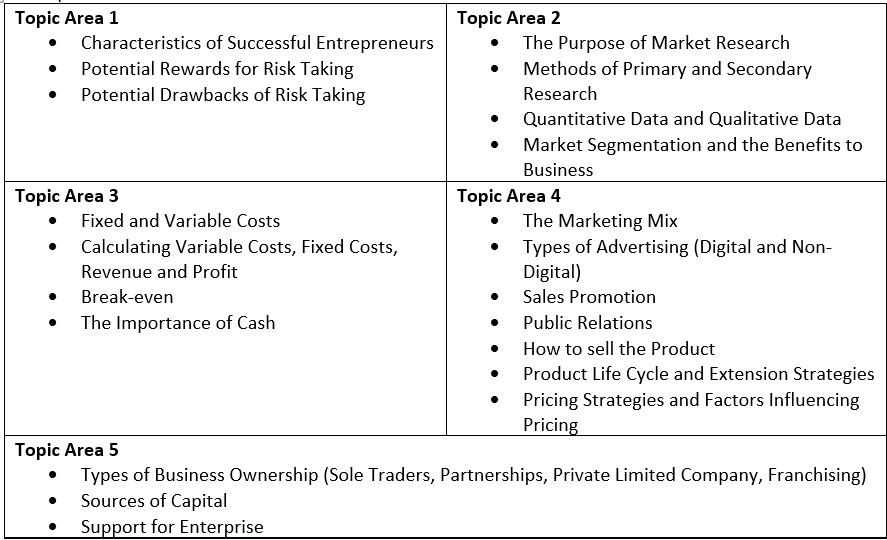
Internally Assessed Module (R069)
In addition, students still have to submit their final piece of coursework for Module R069. This is where the students have to market and pitch their business proposal.
Useful websites
The course is a relatively small nationally with no specialist websites. Revision guides will be given to students during the revision programme after October half term.
Key Dates
- Friday 28th October 2023 – Deadline for tasks 1 and 3 of the R069 coursework
- Friday 12th January 2024 (am) – R067 January Examination
- Friday 29th March 2024 – Deadline for the tasks 3-5 of the R069 coursework
- Tuesday 21st May 2024 (am) – R067 Summer Examination
Intervention
Students can attend bespoke intervention for their coursework or exam support on any evening. Please see Mr Mason for more details.
Hospitality and Catering – WJEC Level 1/ 2
This course comprises of two components, one coursework based and one exam. Students will sit an exam in the November PPE series on the externally assessed unit.
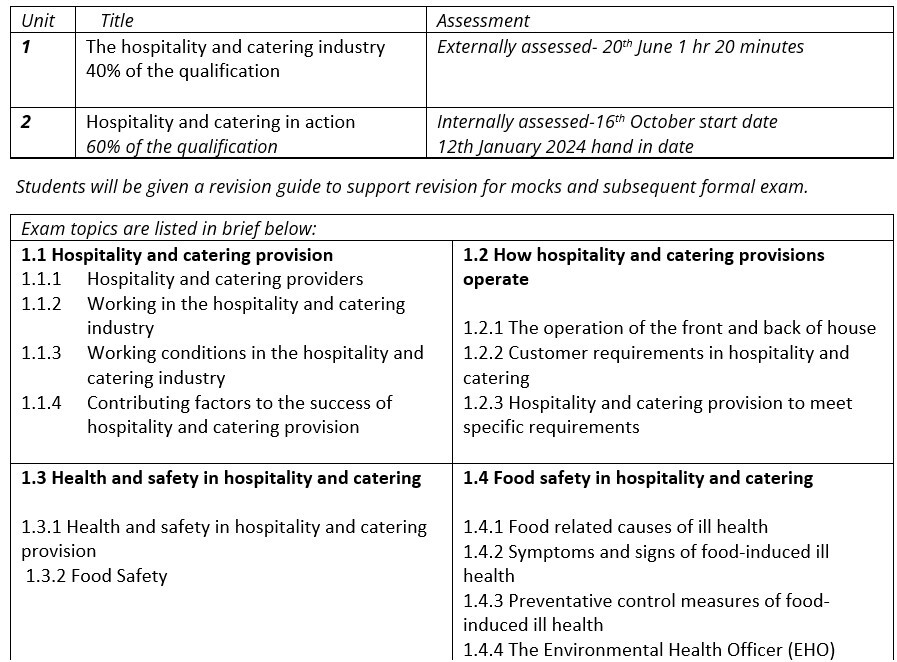
Useful Websites
The course is relatively small nationally with no specialist websites. The following sites will support revision for the coursework unit.
https://www.cram.com/flashcards/create
https://classroom.remembermore.app/
Key dates:
- Internally assessed unit start date: 16th October – 11th November and 4th December 2023 to 13th January 2024 - students MUST attend these sessions during this timed controlled assessment period.
- Internal formal practical assessment date: W/C 11th December 2023
Intervention:
- Intervention is with Mrs Field in N9 or Miss Pawley in T3 Thursday 2:40pm – 3:40pm
- It is essential that students practise their practical skills out of lesson time to ensure they are confident in making independently and to a strict time frame. Mrs Field/ Miss Pawley can support with recipes and advice prior to but not during the practical exam.
Health & Social Care- OCR Cambridge National
There are three units of work that make up the course; two centre-assessed tasks and one exam. Students will sit an exam in the November PPE series on the externally assessed unit.
Externally assessed unit: R032: Principles of care in health and social care settings
- Topic Area 1: The rights of service users in health and social care settings
- Topic Area 2: Person-centered values
- Topic Area 3: Effective communication in health and social care settings
- Topic Area 4: Protecting service users and service providers in health and social care settings
Coursework unit: R033: Supporting individuals through life events
- Topic Area 1: Life stages
- Topic Area 2: Impacts of life events
- Topic Area 3: Sources of support
Coursework unit: R035: Health promotion campaigns
- Topic Area 1: Current public health issues and the impact on society
- Topic Area 2: Factors influencing health
- Topic Area 3: Plan and create a health promotion campaign
- Topic Area 4: Deliver and evaluate a health promotion campaign
Useful Websites
The course is relatively small nationally with no specialist websites. Students will be provided with Cambridge National Level 1/2 Health and Social Care ‘my revision notes’ book.
Key Dates
- Submission date R033: 2nd October 2023
- Deadline R035: TBC April 2024
- Practical internal assessment date: 26th February 2024 all students must be present on this date.
- Summer Exam: R031 Principles of care in health and social care settings – 1 hr exam
Intervention
- Intervention takes place every Thursday or Friday at 2:40pm - 3:40pm in N9 with Mrs Field.
- It is essential that students attend at least one session a week to ensure they have adequate time to develop a detailed record and plan for their coursework.
ICT – WJEC Level 1/2
Externally Assessed Unit 1 (ICT in Society) Examination
There will be no PPE in this subject in November 2023. Instead all students will do a trial examination in January 2024. This will be externally marked by WJEC. The examination will also take place on a computer screen.
The topics on this examination are as follows:
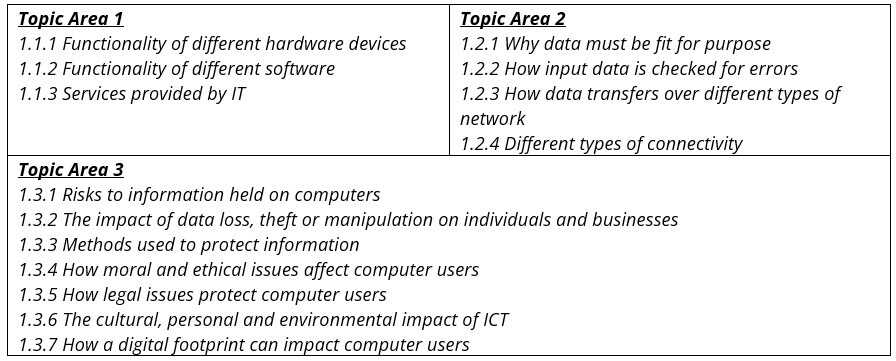
Useful websites
The course is relatively small nationally with no specialist websites. Unfortunately, there are no revision guides available for this course. Instead knowledge organisers for each Topic Area will be given to the students during the teaching after October half term
Key Dates
- Thursday 18th January 2024 (am) – Unit 1 January Examination
- Thursday 23rd May 2024 (am) – Unit 1 Summer Examination
Intervention
Students can attend bespoke intervention for their coursework or exam support on any evening. Please see Mr Mason for more details.
Media Studies - Eduqas GCSE
There are three components to the Media GCSE which are assessed by two written examinations and one non-exam assessment. For the November mock, students will sit one exam that will assess student knowledge from both component 1 and component 2. Please see details below for the content that will be assessed.
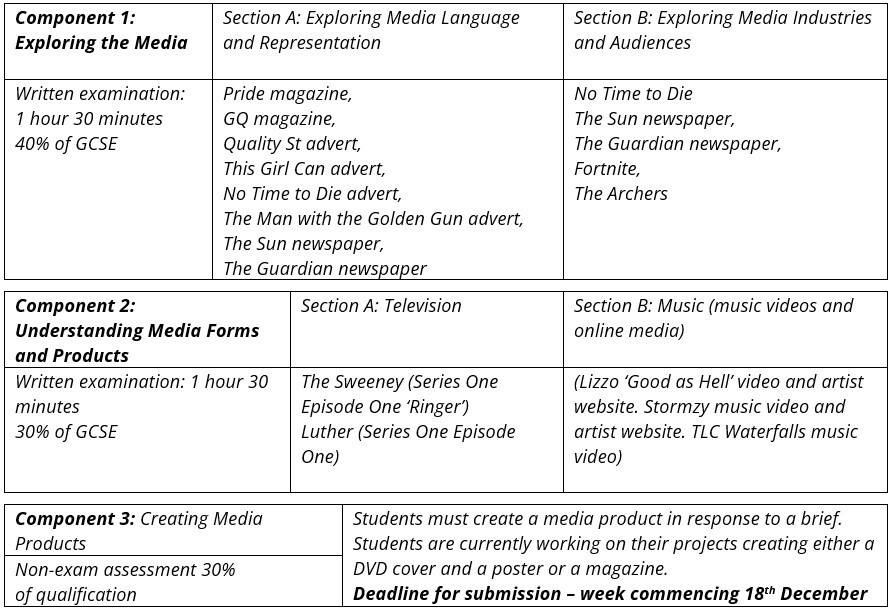
Useful Websites:
https://mediaknowall.com/blog/gcse
https://www.bbc.co.uk/bitesize/subjects/ztnygk7?scrlybrkr=a9e1134f
https://www.bbc.co.uk/bitesize/subjects/ztnygk7?scrlybrkr=a9e1134f
Intervention:
Students will be invited to bespoke intervention in the lead up to the summer exam.
Music Practice - BTEC Tech Award
The course is comprised of three components and gives students the opportunity to develop a broad knowledge and understanding of the performing arts industry. As this course is predominately coursework (components 1 and 2) there is no mock exam in November.
For your information, please see the brief overview of each component.
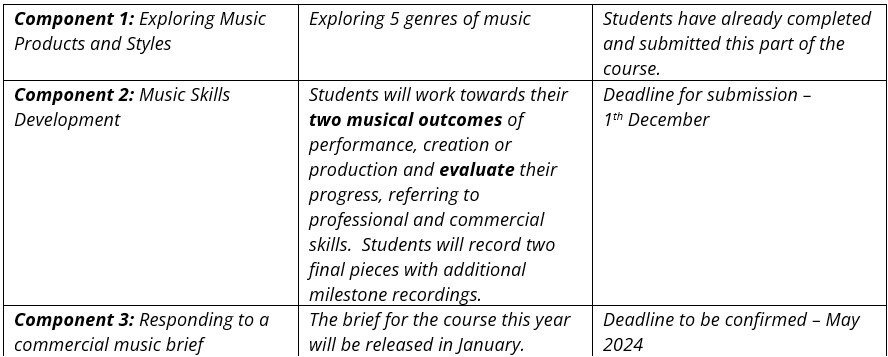
Useful Websites
Research undertaken will be dependent on choice of exam question chosen by individuals. Suggested sources of inspiration will be supplied as part of the exam process.
Intervention
- Students need to attend their individual music lesson for their given instrument each week
- Students should engage in regular practice in and out of school
- Additional recording days are arranged for 17th and 18th October-arranged via Mrs Clethero
- Afterschool intervention is bespoke in music and is designed specifically for each student. Please contact Mrs Clethero for more information.
Photography - AQA GCSE
Photography students must complete component 1 (coursework portfolio, 60% of the overall GCSE grade) and component 2 (externally set exam, 40% of the overall GCSE grade).
There are four Assessment Objectives which are each marked out of 24, the total maximum marks available is 96. The coursework and externally set unit are marked separately.
- AO1: Develop ideas and respond to the work of others
- AO2: Refine ideas and experiment with different media
- AO3: Record ideas – observations, drawings, photographs and written notes
- AO4: Create a personal response.
The coursework portfolio must include both:
- A sustained project developed in response to a theme, evidencing the journey from initial engagement with an idea to the realisation of intentions.
- A selection of further work resulting from projects undertaken in year 10.
The work submitted for this component will be marked as a whole.
Component 1 Coursework deadline – December 2023
November PPE - there will be a 5-hour session for students to work on an outcome for their current coursework project.
AO3 requires the recording of ideas – a good project would ideally have around 6-10 contact sheets of the student’s own photographs. A contact sheet would be around 30 images. Please ensure your child is taking relevant photographs, out of school, every week, for both the coursework and exam units.
The externally set exam must include:
A sustained project developed in response to a theme, evidencing the journey from initial engagement with an idea to the realisation of intentions.
The Controlled Test paper will be given out the first week in January. It consists of seven themed starting points; students will choose ONE starting point.
Students will work their way through the project, developing ideas, looking at the work of other artists, creating work in the style of the artist and refining ideas using a wide range of media and editing techniques.
The controlled test culminates in a 10-hour timed session, usually run over two school days. At this point sketchbooks must remain in school and are not allowed to be added to. The timed sessions will run in March 2024.
Intervention:
- Tuesday, Thursday and Friday afternoons 2:40pm – 3:40pm
- Attendance at Intervention and any drop-down days is compulsory. Mrs McIntosh will provide further details on an individual basis.
Textiles – AQA GCSE
Textiles students must complete component 1 (coursework portfolio, 60% of the overall GCSE grade) and component 2 (externally set exam, 40% of the overall GCSE grade).
There are four Assessment Objectives which are each marked out of 24, the total maximum marks available is 96. The coursework and externally set unit are marked separately.
- AO1: Develop ideas and respond to the work of others
- AO2: Refine ideas and experiment with different media
- AO3: Record ideas – observations, drawings, photographs and written notes
- AO4: Create a personal response.
The coursework portfolio must include both:
- A sustained project developed in response to a theme, evidencing the journey from initial engagement with an idea to the realisation of intentions.
- A selection of further work resulting from projects undertaken in year 10.
The work submitted for this component will be marked as a whole.
Component 1 Coursework deadline – December 2023
November PPE - there will be a 5-hour session for students to work on an outcome for their current coursework project.
The externally set exam must include:
A sustained project developed in response to a theme, evidencing the journey from initial engagement with an idea to the realisation of intentions.
The Controlled Test paper will be given out the first week in January. It consists of seven themed starting points; students will choose ONE starting point.
Students will work their way through the project, developing ideas, looking at the work of other artists, creating work in the style of the artist and refining ideas using a wide range of media and techniques.
The controlled test culminates in a 10-hour timed session, usually run over two school days. At this point sketchbooks must remain in school and are not allowed to be added to. The timed sessions will run in March 2024.
Intervention:
- Friday afternoons 2:40pm – 3:40pm
- Attendance at Intervention and any drop-down days is compulsory. Mrs McIntosh will provide further details on an individual basis.
Sports Science - OCR Cambridge National
Exam Information
November PPE will take place for all Y11 sport science students for the R180: Reducing sport injuries unit. This will be then followed by the first, of two if required, attempts at the official examination, on Thursday 11th January 2024.
Useful Websites
https://www.ocr.org.uk/qualifications/cambridge-nationals/sport-science-level-1-2-j828/assessment/
Intervention
Intervention takes place on Monday and Wednesday at 2:40pm - 3:40pm following the set plan below.
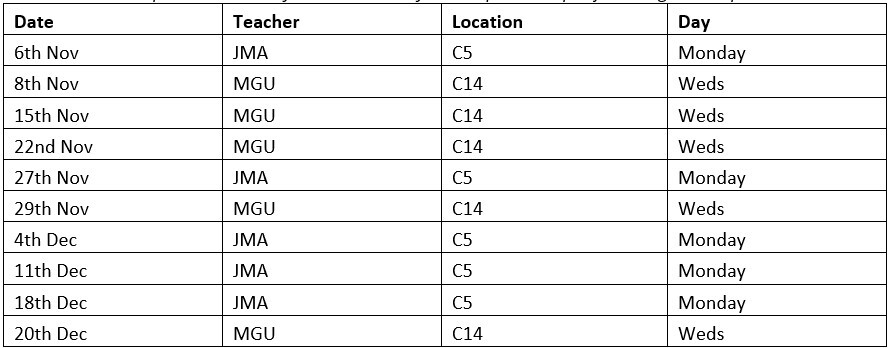
Additional coursework sessions, if required, will also be available to students every Wednesday in N9 with either RNE or LHO, again 2:40 - 3:40pm.
Completed units of work
R181: Applying the principles of training. NEA (coursework) unit – Grades submitted on 30th September. Results due back into school 14th December 2023.
R183: Nutrition and sports performance. NEA (coursework) unit – Grades submitted on 30th September. Results due back into school 14th December 2023.
Key dates
January exam: R180 Reducing Sports Injury: 11th January 2024. Results due 14th March 2024
Summer exam / Re-sit if required: R180 Reducing Sports Injury: 20th May 2024. Results due 22nd August 2024
Creative iMedia - OCR Cambridge National
Mock Exam Information
There is no Autumn Mock exam. This course is predominantly coursework based. Students are spending the Autumn term completing their coursework projects. We will focus on the exam from January and mock exams will occur after then
Exam Information
The exam will be 75 minutes long and contains 60 marks. It is mainly short answer questions (up to 4 lines) with one extended question. The exam focuses on how someone may plan a creative project. This is split across eight stages:
-
Understanding what a client wants you to make
-
Defining and appealing to an audience
-
Planning tools & visualisation methods
-
Useful IT Tools
-
Legislation
-
Health and Safety
-
Organising your work. Keeping it safe and secure
-
Giving a reasoned evaluation/opinion of a creative plan
The scenarios for questions do not affect the knowledge required but may include the projects we have completed in lesson (information points, digital graphics and video games) and other creative works (posters, videos, 3D-graphics)
Useful Websites
The course is a relatively small nationally with no specialist websites. Students will be provided with a knowledge organiser in January to support their exam preparation. A letter with details of the most appropriate revision guide will be distributed in December.
Intervention
-
Friday in C14
